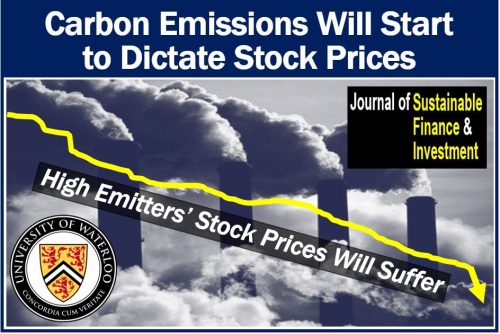Carbon emissions will begin dictating stock prices, say researchers at the University of Waterloo in Canada. Businesses that fail to reduce or restrict their carbon output, i.e., carbon emissions, may eventually face declining stock prices. They may also face asset devaluations.
Mingyu Fang, Ken Seng Tan, and Tony S. Wirjanto wrote about their study and findings in the Journal of Sustainable Finance & Investment (citation below).
They also determined that there could be a negative impact on the stock market in general within a decade. The negative impact would be due to companies not taking action to reduce their carbon emissions.
Carbon emissions – stock prices in carbon-intensive sectors
Lead author, Mingyu Fang, a PhD candidate at Waterloo’s Department of Statistics & Actuarial Science, said:
“Over the long-term, companies from the carbon-intensive sectors that fail to take proper recognizable emission abatements may be expected to experience fundamental devaluations in their stocks when the climate change risk gets priced correctly by the market.”
“More specifically for the traditional energy sector, such devaluation will likely start from their oil reserves being stranded by stricter environmental regulations as part of a sustainable, global effort to mitigate the effects caused by climate change.”
“Those companies may find that large portions of the reserves are at risk of being unexploitable for potential economic gains.”

Climate change refers to the long-term shift in Earth’s average temperatures and weather patterns. Global warming is a type of climate change, but only when temperatures are rising.
If temperatures across the planet are declining, that is a climate change matter but not a global warming one.
How does climate change affect investment portfolios
Climate change can affect investment portfolios in two ways:
- It raises weather-related physical risk to infrastructure assets and real properties. The risk is greater in climate-sensitive regions.
- It triggers stricter environmental rules and regulations and higher carbon emission costs. This has a negative effect on the business activities of carbon-intensive industries.
Regarding the impact on investment, the University of Waterloo wrote the following in a press release:
“This indirect impact of climate change on investments will effectively be transformed into a political risk affecting particular asset classes, often referred to as the investment carbon risk.”
Analysis of companies with large carbon emissions
This study grew out of Fang’s doctoral thesis as well as a funded research project – ‘Managing Climate and Carbon Risk in Investment Portfolios‘ – by the Society of Actuaries. The researchers carried out an inter-temporal analysis of stock returns.
They analyzed data from 36 publicly traded heavy carbon emitters in related sector indices from North America and Europe. They focused their analyses around the ratification of major climate protocols.
Just nine of the 36 samples displayed recognizable carbon pricing. They also compared the historical performance of the emission-heavy sectors against those of other industries. Energy and utilities, for example, are emission-heavy sectors. In other words, their carbon emissions are relatively high.
Regarding the carbon-intensive sectors, the University of Waterloo informs:
“The carbon-intensive sectors consistently ranked at the bottom of the list across the metrics used and underperformed the market indices for both Europe and North America.”
Prof. Tony Wirjanto said:
“It is in the best interest of companies in the financial, insurance, and pension industries to price this carbon risk correctly in their asset allocations.”
“Companies have to take climate change into consideration to build an optimal and sustainable portfolio in the long run under the climate change risk.”
Wirjanto, a professor jointly appointed in Waterloo’s School of Accounting & Finance and Department of Statistics & Actuarial Science, was also Fang’s PhD thesis supervisor.
Citation
“Sustainable portfolio management under climate change,” Mingyu Fang, Ken Seng Tan, and Tony S. Wirjanto. Journal of Sustainable Finance & Investment 9:1, 45-67, DOI: 10.1080/20430795.2018.1522583.
